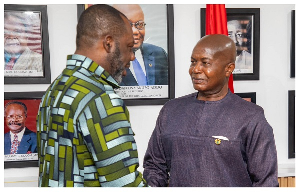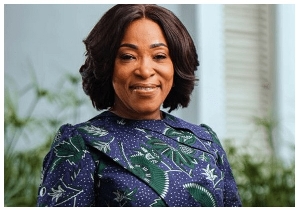- Home - News
- TWI News | TV
- Polls
- Year In Review
- News Archive
- Crime & Punishment
- Politics
- Regional
- Editorial
- Health
- Ghanaians Abroad
- Tabloid
- Africa
- Religion
- Election 2020
- Coronavirus
- News Videos | TV
- Photo Archives
- News Headlines
- Press Release
General News of Thursday, 14 December 2006
Source: GNA
Geological Survey gets mobile Geo-laboratory
Accra, Dec. 14, GNA - The intensified exploitation of minerals is leading to a rapid depletion of known mineral resources in Ghana, and if new deposits were not discovered, the future of the industry would look bleak.
This observation was made by Professor Dominic Fobih, Minister of Lands, Forestry and Mines, on Thursday at the launch of a website for the Ministry and the handing over of a mobile Geo-laboratory to the Geological Survey Department in Accra.
He said the government has therefore sought assistance of 40 million Euro from the European Union to undertake the Mining Sector Support Programme (MSSP) with a large component aimed at increasing geological information base of the country through exploration. This, the Minister said, said was to discover new deposits with the view to increase reserves of known deposits and the discovery of minerals, other than the known ones.
Prof. Fobih said the main component of the programme was the institutional reinforcement and capacity building of the ministry and its sector institutions to enable them to fulfil their facilitating and regulatory roles in the mining industry.
He said the MSSP programme would also provide technical assistance and Information Management System (IMS), which also includes Information Technology, infrastructure, website or homepage design and the creation of Geo-database.
He urged the staff to take advantage of the training component of the project to upgrade their skills to enable them to take good care of the facility, when the German contractor, Beak Consultants leaves. The Minister thanked the head of the European Commission Delegation for the grant, which, he said, would contribute in no small way to improve the mining industry.
Mr John Agyei Duodu, Acting Director, Geological Survey Department, said a good geological laboratory was indispensable for the analysis of rock and mineral resources in a country like Ghana.
He cautioned that if geological data was well packaged, digitised and effectively disseminated in a user-friendly manner, it might not achieve the needed impact in attracting investors.
Mr Duodu said the MSSP would sustain the mining sector's economic performance, alleviate poverty by increasing employment and mitigate the negative environmental impacts of mining activities.
He said the MSSP, among other things, would provide modern geological information and construct new maps and databases through geological mapping of six selected areas and airborne geological surveys of the Voltaian and Keta basins.
He explained that geological mapping of three of the six selected areas (Bole, Sawla-Tuna and Kalba-Wa in the Northern and Upper West regions) in the Northern and Upper West regions had been completed and two of the three remaining areas (Nkwanta in the Volta Region and Wassa Akropong and Asankrangwa in the Western Region) had begun. Fieldwork at Gambaga in the Upper East Region would begin in January 2007. He said a consortium, made up of the Council of Geo-science from South Africa, BRGM from France and Geoman Consult of Ghana set up the mobile Geo-laboratory for the analysis of field samples and its first phase of the fieldwork and sample preparation had been completed. Mr Filiberto Ceriani Sebregondi, Head of the European Commission to Ghana, providing information was key for Ghana to further promote its valuable assets.
He said the new website was an important tool, which would provide the industry on mining opportunities.
Mr Sebregondi pledged EU's support for a feasibility study of roads and railway line networks in the mining areas of the Western Region to facilitate transportation of minerals in the region. The study would include the modernisation of the container terminal at the Takoradi Harbour.
Prof. Fobih launched the Ministry of Lands, Forestry and Mines' website (Ghana-mining.org).
Entertainment









